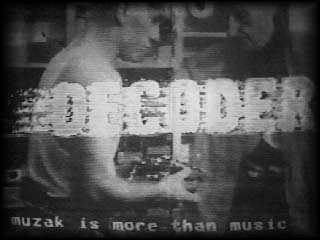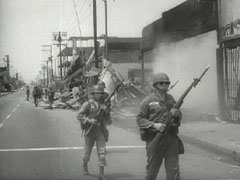Topic: Film
 "A trashy little low-budget underground movie, Decoder reflects the zeitgeist of its time. The 1984 of Orwell is imminent, and apocalyptic signs can be seen everywhere. In Decoder, muzak represents indisputable evil, the totalitarian, multinational brainwashing masked under an anonymous, seemingly neutral façade. Or, as the producers so succinctly put it: "Decoder shows that film can be more than two dimensional pictures plus the spoken word. Before the script writers Maeck, Muscha, Schaefer, Trimpop started to shoot in slums and fast-food chain-stores they did quite some research on the phenomenon of muzak: music recorded with special filtering and mixing techniques for stimulating productivity and employee morale as well as the comfort of the consumer, used by big industries, warehouses and department stores, restaurant chains and hospitals. This art product of doctors, musicians and marketing experts is only known as background music, whose subliminal effects no one is usually aware of."
"A trashy little low-budget underground movie, Decoder reflects the zeitgeist of its time. The 1984 of Orwell is imminent, and apocalyptic signs can be seen everywhere. In Decoder, muzak represents indisputable evil, the totalitarian, multinational brainwashing masked under an anonymous, seemingly neutral façade. Or, as the producers so succinctly put it: "Decoder shows that film can be more than two dimensional pictures plus the spoken word. Before the script writers Maeck, Muscha, Schaefer, Trimpop started to shoot in slums and fast-food chain-stores they did quite some research on the phenomenon of muzak: music recorded with special filtering and mixing techniques for stimulating productivity and employee morale as well as the comfort of the consumer, used by big industries, warehouses and department stores, restaurant chains and hospitals. This art product of doctors, musicians and marketing experts is only known as background music, whose subliminal effects no one is usually aware of."
Zitat gefunden bei Popmoderne. Dort gibt es auch weiterführende Links.
Der Begriff Muzak ist mir zum erstenmal bei Thomas Pynchon begegnet. Unteranderem taucht er in seinem Artikel A Journey into the Mind of Watts auf. Zu diesen Riots siehe auch ein weiterführendes Posting von pcl-linkdump

Ein anderesmal verwendet er den Begriff Muzak in seiner Erzählung "The Crying of Lot 49". Im ersten Kapitel wird die Heldin und " her trip to the market in downtown Kinneret-Among-The-Pines to buy ricotta and listen to the Muzak (…)" kurz beschrieben. Musik ist ein zentrales Thema dieser Kurzgeschichte.
zettel | 01. Mai 06